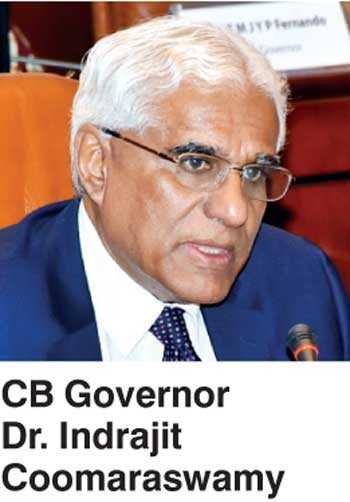Sunday Feb 22, 2026
Sunday Feb 22, 2026
Thursday, 15 November 2018 01:06 - - {{hitsCtrl.values.hits}}
 By Uditha Jayasinghe
By Uditha Jayasinghe
The Central Bank yesterday reduced the Statutory Reserve Ratio (SRR) by 1.50 percentage points with the aim of injecting Rs. 90 billion into the market to spur growth and shrink the output gap, but raised the Standing Deposit Facility Rate (SDFR) and Standing Lending Facility Rate (SLFR) to counter a possible hike in inflation.
Preserving the neutrality of its Monetary Policy, the Central Bank sought to stay true to its fiscal consolidation policies. Central Bank Governor Dr. Indrajit Coomaraswamy explained the thought process behind the move and said adjustments were also expected to narrow the spread between deposit and lending rates in the market.
In order to neutralise the impact of the SRR reduction and maintain its neutral monetary policy stance, the Monetary Board decided to increase the Standing Deposit Facility Rate (SDFR) of the Central Bank by 75 basis points to 8.00% and the Standing Lending Facility Rate (SLFR) of the Central Bank by 50 basis points to 9.00%.
“Despite the political uncertainty the Central Bank has been operating business as usual. The Monetary Board decision made yesterday was in line with the proactive and evidence-based monetary policy formulation followed by the Central Bank. When the Monetary Board deliberated, it had to take into account two key issues; one was the acute shortage of liquidity of markets and the other was to determine whether the neutral monetary policy stance adopted in April should be continued,” he said.
Among the factors considered was sub-par growth as the Central Bank had reduced its economic expansion estimate to 3.6% from 4% for 2018. The Central Bank also noted that a significant output gap remained in the economy that called for loosening monetary policy. However, these were weighted against high interest rates, moderating monetary growth, and low core inflation.
Rising international interest rates, which had triggered more outflows from emerging markets, as well as a widening trade deficit also argued for tightening, Dr. Coomaraswamy pointed out. Despite concerns of a widening trade deficit the Monetary Board had felt that the recent tax increases on vehicles and gold were adequate to address those concerns. Reduced oil prices along with strong rains augured well for a positive boost to the economy, which made future prospects rosier, he observed.
“There is always the risk of fiscal slippage, though for the moment there isn’t much evidence of that. The Monetary Board took the view that they have to take some action to infuse liquidity into the system and therefore decided on the 150 basis points reduction in the SRR. The Monetary Board also took the view it should maintain its neutral policy view. In order to do that it had to adjust the policy rates upwards to mitigate for the loosening SRR, which is why you have this combination of measures.”
Acknowledging that prolonged political unrest could be challenging for the economy Dr. Coomaraswamy was nonetheless sanguine about policy changes since 26 October.
When questioned about the fuel price formula, Dr. Coomaraswamy contended that it had not been dispensed with completely and only the calculation of prices and the dates of price announcements had changed. He stated that as long as the policy of having a transparent mechanism that passes through international prices remained, then a change in the calculation was not a significant problem.
“Any government would want to have its own imprint on policy but what is important is that it takes place within the framework which does not cause macroeconomic instability.”
Tax changes and revisions that were announced a day after Finance Minister Mahinda Rajapaksa assumed duties would require Parliamentary approval and are unlikely to be passed till next year, he said.
Other changes such as the Telecommunications Levy, which has been implemented, would only have an impact of 0.03% of GDP. He recalled that even though the Finance Ministry had announced tax cuts, it remained committed to meeting the 4.8% budget deficit for 2018, which was a positive point, and allowed optimism that the fiscal consolidation path would be largely followed.
Business confidence would need a boost through political stability and more consistent policies, he noted.
“Business confidence is low. From the time of the Local Government elections, there has been some uncertainty in the system. This could be a reason as to why growth has not been as high as we hoped it would be. But there are some positive signs because FDI this year is going to be a record and exports are probably going to be a record as well. So growth will certainly be above 4%, somewhere between 4%-4.5% for 2019. One of the big boosts to growth is when you have a large hydro growth. Not only does it save foreign exchange but it’s a very high value addition activity.”
The Central Bank is also continuing to engage on the $ 1.5 billion Extended Fund Facility (EFF) with the International Monetary Fund (IMF) with developments expected once the political situation settles.
“As of October there was a staff level agreement, which means that the Government of Sri Lanka was able to agree on a program that satisfied the IMF in terms of its Extended Fund Facility (EFF) and from that point the path would have entailed the staff of the IMF presenting a paper about the middle of November and the Board of the IMF was to meet in the first week of December. But that is delayed now because the IMF would want to see what the Government in place would want to change any of the elements of what was agreed on 26 October. So we have to wait and see.
“But even if one does not have a vote of account, the Government of Sri Lanka is ready to meet its debt obligations. The repayments on existing borrowings can go ahead. There is no need to have a vote on that.”